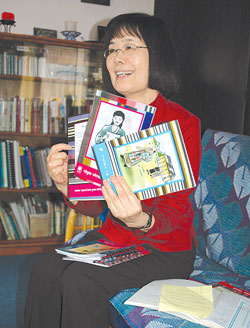|
|
"I hope members of different language groups may attend such a workshop and produce a book in their mother tongue. That way they motivate others to learn to read and to keep reading", says Noriko Matsuura, in the gentle but animated manner that is her trademark.
Noriko, or Nori for short, first came to Nepal in May 1996 as a member of SIL International. She first worked with the Research Centre for Education Innovation and Development at Tribhuban University (CERID) and the Department of Education, and presently runs Mother Tongue Pipal Pustak. Matsuura is also a visiting scholar from Sophia University in Tokyo, attached to the Linguistic Institute for International Communication.
In 1997, when Matsuura was working on one of the Rai languages spoken in eastern Nepal, members of the community became interested in having translations of the Nepali language Pipal Pustak books in their own language. Pipal Books was developed by the non-formal education support office of the United Mission to Nepal to support literacy by easing the transition from oral communication to the conventions of print. Starting with only four titles, by 2002 Matsuura had already organised for sixteen different story books to be translated into eight of Nepal's ethnic mother tongues.
The next step was to provide a structured framework for people to write narratives in their mother tongues rather than simply translating stories from Nepali. With this in mind, the first Mother Tongue Pipal Pustak workshop was held in 2005, at which members of four language communities were given two weeks in which to write a book in their mother tongue based on their own life experiences.
Some basic agreement about orthography must already exist for the production of a story book to be worthwhile, limiting participation to speakers of languages with a written form already under development. However, we should not forget that most written systems are standardised by and through use, and not by committee, so having a diverse set of printed materials in circulation is an important first step in the often long process of standardisation.
In the yearly January workshop (planned at a quiet time in the agricultural cycle), the fledgling authors formulate written texts from oral narratives drawn from their own lives under the supervision of trainers. With an artist, a graphic designer and computer staff on hand, each participant creates a dummy book for field-testing. After revisions and edits, 500 copies of each book are produced and sold to the author at a reduced rate, which they are then able to sell on for a few extra rupees.
Alongside the mother tongue story, each book also contains summaries in Nepali and English, and a short author's biography. To date, thirty Mother Tongue Pipal Pustak books have been produced in nine different languages. Deeply committed to mother tongue education and to the sustainability of Nepal's endangered speech forms, Matsuura would like to train more Nepali facilitators so that they can run workshops in villages, and not require participants to come all the way to Kathmandu.



